Golf is a game steeped in tradition and skill, often considered one of the most challenging sports to master. For many, the allure of the perfect swing, the thrill of sinking a long putt, and the camaraderie found on the course make it irresistible. However, the truth is that mastering golf involves more than just practicing drives and putts.
In this article, we will delve into the many factors that contribute to the difficulty of mastering golf, explore common challenges players face, and offer insights to help you improve your game. Whether you’re a seasoned golfer or a beginner, these insights will help you navigate the complexities of the sport.
The Complexity of the Swing
One of the most significant challenges in mastering golf lies in the golf swing itself. The swing is a multifaceted motion that requires an intricate balance of physical and mental skills. Here are several reasons why the swing is so challenging to perfect:
- Biomechanics: Understanding the body’s movement mechanics is crucial for an effective swing. Small deviations in angle or rotation can lead to drastically different outcomes.
- Timing: The timing of your swing must be precise. Rushing or delaying your swing can result in missed shots or hooks and slices.
- Muscle Memory: Developing the correct muscle memory takes time and dedication. Inconsistent practice can lead to bad habits that are hard to break.
“Golf is a game of inches; the smallest margin can lead to a significant difference in performance.”
 Professional golfer executing a perfect swing
Professional golfer executing a perfect swing
The Mental Challenge
Golf is often described as a mental game as much as a physical one. Here’s why the mental aspect of golf can be particularly challenging:
- Concentration: Maintaining focus throughout a round is critical. Distractions can lead to mistakes, affecting performance.
- Pressure: The pressure to perform can be daunting, especially in competitive settings. Managing this pressure is key to success.
- Self-Assessment: Golfers must continuously evaluate their performance, which can lead to self-doubt and frustration.
Example of Mental Challenges
- First Tee Nerves: Many golfers feel extra pressure when starting their round. This nervousness can lead to poor shots right from the beginning.
- Avoiding Negative Thoughts: It’s easy to dwell on mistakes. Learning to let go of a bad hole is critical for overall performance.
Course Management Skills
Another layer of difficulty lies in course management. It involves strategic decision-making and understanding your strengths and weaknesses in relation to the course layout. Here are some core aspects of effective course management:
- Choosing the Right Club: Understanding which club to use in various situations requires experience and knowledge of distances.
- Playing to Your Strengths: By recognizing your strengths, you can create a plan that leverages these advantages.
- Understanding the Course: Familiarity with the course can inform decisions about when to play aggressively and when to hold back.
 Overhead view of a golf course layout for strategic planning
Overhead view of a golf course layout for strategic planning
Key Strategies for Effective Course Management
- Study the Course: Before playing, analyze the course layout, focusing on hazards and potential trouble spots.
- Develop a Game Plan: Outline your strategy before each round, adjusting it as needed based on performance.
- Learn from Experience: Each round offers an opportunity to learn about course layout and personal strengths.
Table: Key Factors in Course Management
| Factor | Description |
|---|---|
| Course Knowledge | Familiarity with layout and hazards |
| Shot Selection | Choosing the most effective clubs and shots |
| Risk Assessment | Calculating potential alternatives to each shot |
The Importance of Practice
While talent plays a role, consistent practice is essential for mastering golf. The path to improvement is often long and winding. Here’s why dedicated practice proves to be challenging:
- Time Commitment: Developing skills takes time that many find hard to allocate in busy schedules.
- Variety in Practice: Effective practice involves far more than just hitting driving ranges. Incorporating different aspects like short game, putting, and course simulation is vital.
- Feedback and Adjustment: Receiving constructive feedback and being open to change can make a significant difference, yet many golfers don’t seek it out.
 Golfer practicing short game on putting green
Golfer practicing short game on putting green
Practice Tips
- Structured Practice Sessions: Divide your time effectively between driving, chipping, and putting.
- Goals and Benchmarks: Set specific short-term and long-term goals to track your progress.
- Stay Patient: Progress takes time; don’t expect overnight success.
Equipment and Technology
An often-overlooked aspect of mastering golf is the impact of equipment. The right clubs, balls, and accessories can significantly affect performance. Here’s how:
- Fit Matters: Clubs that are not fitted to your body and swing can complicate development.
- The Technology Gap: Each new generation of clubs comes with different technology. Learning how equipment influences play is an ongoing challenge.
- Ball Selection: Understanding the characteristics of different golf balls can enhance performance, but with so many options, it can be overwhelming.
Common Physical Limitations
Many golfers face physical challenges that make mastering the sport even more demanding. For instance:
- Aging: As players age, flexibility and strength can decrease, impacting swing mechanics and stamina.
- Injuries: Previous injuries and their effect become more apparent as one strives to maintain a consistent game.
- Fitness Levels: A lack of physical fitness can lead to fatigue on the course, affecting overall performance.
 Senior golfer stretching for flexibility before round
Senior golfer stretching for flexibility before round
Improving Physical Limitations
- Regular Exercise: Incorporating flexibility and strength training can significantly improve your game.
- Stretching: A robust stretching routine can enhance flexibility, reducing the risk of injury.
- Nutrition: A balanced diet can boost energy levels and overall physical health.
Key Takeaways
- Mastering the swing requires understanding biomechanics, timing, and muscle memory.
- The mental game of golf is as important as the physical aspects, necessitating concentration and pressure management.
- Course management involves strategic decision-making, requiring knowledge of the course and an understanding of personal strengths.
- Practice should be structured, consistent, and diverse to improve various aspects of your game.
- Equipment plays a crucial role in performance; ensure clubs and balls are suitable for your playing style.
- Understand and address physical limitations through fitness, stretching, and proper nutrition.
FAQ Section
1. Why is mastering the golf swing so difficult?
The golf swing is complex, involving biomechanics, timing, and the development of muscle memory.
2. How important is the mental aspect of golf?
The mental side is crucial; maintaining concentration, managing pressure, and avoiding negativity can significantly affect performance.
3. What is course management?
It refers to strategic decision-making on the golf course, focusing on shot selection based on strengths and the course layout.
4. How can I practice effectively?
Use structured practice sessions that consistently cover various aspects of the game, set specific goals, and remain patient.
5. Why does equipment matter in golf?
Equipment can affect performance; using clubs suited to your body and swing can enhance gameplay and improve results.
6. What should I do about physical limitations?
Incorporate regular exercise, stretching, and proper nutrition to mitigate the effects of aging or injuries.
7. How can I develop better course knowledge?
Study the course layout before playing and consider using resources like GPS apps and yardage books.
8. Is there a specific fitness regimen for golfers?
Yes, focusing on core strength, flexibility, and endurance can improve your performance on the course.
9. How can I manage performance pressure?
Practice mindfulness techniques or visualization to help remain calm under pressure.
10. Can practicing alone help improve my game?
While practicing alone can be beneficial, engaging with coaches or playing with others helps in getting feedback and learning from different gameplay styles.
Mastering golf is no small feat. The combination of mechanical skill, strategic thinking, and physical conditioning presents a unique blend of challenges, yet with dedication and the right approach, you can improve and enjoy this timeless sport. Put these tips into action, and you may find yourself conquering the course sooner than you think!

